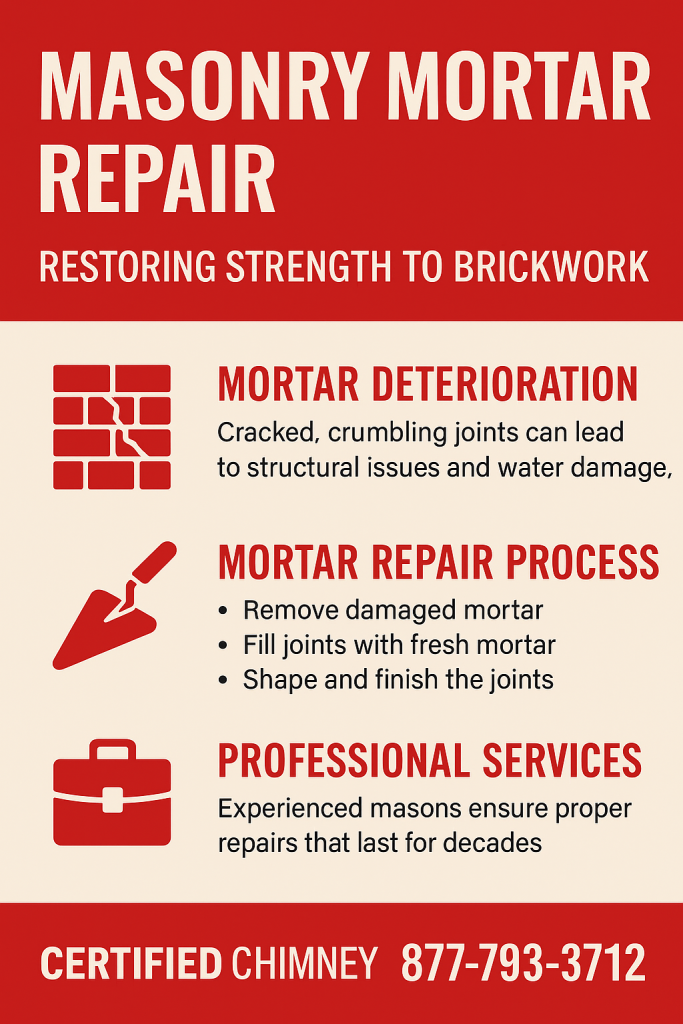Masonry Mortar Repair Services New York
Our masonry mortar repair services restore the strength and appearance of your brickwork. From sealing cracks to rebuilding joints, Certified Chimney ensures lasting protection against water damage and structural wear.
Licensed and Insured
Certified Chimney is fully licensed and insured, giving you peace of mind with every service across Long Island, NYC, and Westchester County.
Certified Experts
Our highly trained, certified chimney technicians uphold the highest standards of safety and quality on every project.
Customer Satisfaction Guaranteed
We prioritize your satisfaction, offering personalized service and expert attention to keep your chimney in top condition.
Masonry mortar repair is one of the most important aspects of maintaining a safe and durable brick wall or masonry unit structure. Over time, mortar joints are exposed to weather, moisture, and natural wear. When damaged mortar joints go unrepaired, they can compromise the structural integrity of the wall and allow water damage to spread. With the right mortar mix, tools, and proper technique, homeowners and professionals can restore the life of a masonry wall and preserve its stability for decades.
Understanding Mortar Deterioration
Mortar naturally breaks down as it is exposed to freeze-thaw cycles, water intrusion, and changes in mortar temperature. Cracking, crumbling, or gaps between bricks are clear signs that a repair project is needed. If left unchecked, these gaps can widen into foundation cracks or contribute to missing brick problems.
In older historic districts, mortar may fail because it was made from lime mortar, which is softer than modern mixes. In these cases, it’s important to use a compatible material rather than a rigid Portland cement that could damage the surrounding masonry.
Choosing the Right Mortar Mix
Types of Mortar for Repairs
- Type N Mortar – A general-purpose masonry mortar used for masonry walls, chimneys, and interior walls. Balanced strength makes it ideal for most repair projects.
- Type O Mortar – A weaker mortar suitable for non-load-bearing walls and historic masonry surfaces.
- Portland Cement-Based Mortar – Offers strength for heavy-duty repairs but may not be suitable for softer or facade mortar repairs.
Standards such as ASTM C270 ensure proper performance for repair mortar applications. For small cracks or damaged mortar joints, products like mortar filler or specialized acrylic formulas provide reliable solutions.
Step-by-Step Mortar Joint Repair
Removing and Cleaning Joints
The first step is to clear out old, crumbling mortar using a grout saw or cold chisel. Joints should be cleaned to a uniform depth, typically ½ to ¾ of an inch. A wire brush helps remove dust and debris.
Applying New Mortar
Dampen the area with a garden hose to prevent premature drying. Using the right mortar mix, apply fresh brick mortar into the cleaned joints with a trowel or applicator tip. Press the mortar firmly to eliminate voids.
Finishing and Curing
Shape the joints with a jointer for a smooth finish, then cover with masking tape or light misting to retain moisture while curing. Proper curing prevents cracking and ensures the repair bonds securely to the existing wall.

Tools and Materials Needed
Before starting a repair, gather proper safety equipment and masonry tools.
- Safety glasses and waterproof gloves to protect from dust and debris.
- Cold chisel and grout saw for removing deteriorated mortar.
- Wire brush for cleaning masonry surfaces.
- Caulk gun with Polyurethane Mortar Joint Sealant or other compounds for small gap sealing.
- Garden hose for dampening joints before applying new mortar.
DIY vs. Professional Masonry Repair
While a DIY enthusiast can handle small cracks or surface filler compound applications, more complex repair projects should be left to a masonry professional. Improper mortar selection, poor joint cleaning, or rushing the curing process can shorten the lifespan of the repair. For significant foundation cracks or repairs in historic masonry, hiring a professional mason ensures compliance with standards like ASTM C 270 and preserves the building’s integrity.
Conclusion
Masonry mortar repair is a critical part of preserving the strength and appearance of your brick masonry surfaces. By selecting the right mortar mix, using proper tools, and following proven repair steps, homeowners can extend the life of their mortared walls and avoid costly structural problems. For larger repairs, Certified Chimney’s team of experts provides safe, durable, and long-lasting solutions tailored to your property’s needs.
See All Services
Don’t Hesitate to Reach Out – We’re Here to Help Every Step of the Way
Testimonials
See Why Homeowners Trust Certified Chimney
